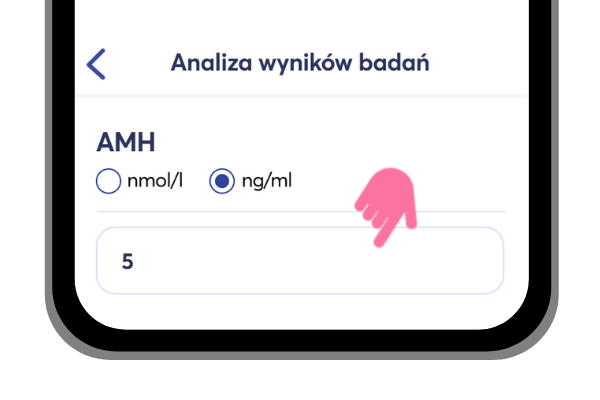Hormonal test and the correct interpretation of their results are very important in evaluating fertility. Hormonal balance is crucial for the course of the cycle, ovulation, and the possibility of getting pregnant. In the iYoni application, you can check how a doctor looks at the test results, as well as get tips on what to look for in their evaluation. However, remember that the application is not a diagnostic tool and does not replace a medical consultation.
Why test hormones?
Sex hormones regulate processes such as ovulation, egg production, implantation of a fertilized egg in the uterus, and fetal development. Hormone tests help to understand whether the endocrine system is functioning properly and if any disorders that may affect the ability to get pregnant can be suspected. Hormonal tests are also useful in diagnosing various diseases that can affect fertility, such as hyperthyroidism or hypothyroidism, polycystic ovary syndrome (PCOS), or ovarian dysfunction.
Which hormones can I analyze in iYoni?
In the application, you can enter the most important hormones that affect fertility, such as AMH, estradiol, progesterone, FSH, LH, Inhibin-B, testosterone, prolactin, DHEAS, and TSH. You can enter and analyze one result or several. What is the role of the above hormones in female fertility?
AMH (Anti-Mullerian Hormone) – is produced by ovarian cells and is an indicator of ovarian reserve. Measuring AMH levels allows to determine of the number of ovarian follicles and ovarian reserve in women, which is important for diagnosis of infertility.
Estradiol – is one of the main female hormones, produced by ovarian follicles. It affects the development of female sexual characteristics and regulates the menstrual cycle. During the follicular phase of the menstrual cycle, the level of estradiol rises, which affects the growth of ovarian follicles, and during the luteal phase, the level of estradiol decreases, which is necessary for the preparation of the endometrium for embryo implantation.
Progesterone – is a hormone produced by the corpus luteum. It prepares the endometrium for embryo implantation and maintains pregnancy. If fertilization fails to occur, the corpus luteum atrophies, which causes a decrease in progesterone levels and triggers menstruation.
FSH (follicle-stimulating hormone) – is a hormone produced by the pituitary gland. It affects the development of ovarian follicles and the production of estradiol. A high level of FSH may indicate decreased ovarian reserve.
LH (luteinizing hormone) – is also produced by the pituitary gland. It affects ovulation and the production of progesterone by the corpus luteum. A high LH level in the postmenopausal period indicates decrease in the production of sex hormones.
Inhibin-B – is produced by the ovarian follicles and is an indicator of ovarian reserve. A low level of inhibin-B may indicate a decreased ovarian reserve.
TST (testosterone) – is a male hormone, but it also occurs in women in smaller amounts. It participates in the regulation of libido, but excess testosterone in women can cause hormonal disorders and affect fertility. Prolactin – is a hormone produced by the pituitary gland. It affects milk production during lactation, but can also affect fertility. High prolactin levels can cause anovulation and menstrual cycle disorders.
DHEAS (dehydroepiandrosterone sulfate) – is a hormone produced by the adrenal glands. It participates in the production of testosterone and estradiol. High level of DHEAS can affect the development of hormonal abnormalities and ovulation disorders.
TSH (thyroid-stimulating hormone) – is a hormone produced by the pituitary gland. It affects thyroid function and the production of thyroid hormones. Disruptions in TSH levels can affect the regularity of the menstrual cycle and lead to hormonal disorders that affect fertility.
Does the analysis include only hormones?
No, in iYoni you can also analyze the results of anti-TPO and SHBG tests.
SHBG (sex hormone-binding globulin) is a protein that transports sex hormones in the blood. High levels of SHBG can cause a decrease in the amount of free testosterone, which can affect fertility.
Anti-TPO (antibodies against thyroid peroxidase) are antibodies directed against the thyroid peroxidase enzyme. Their presence may indicate thyroid diseases, such as Hashimoto’s syndrome, which can affect menstrual cycle regularity and fertility.
Will I have access to this information after the iYoni analysis?
Yes, your data and analysis are stored in the application and you can access them at any time, for example, to compare how the results have changed over time. However, you cannot add any additional information to them. To perform another analysis, you must allocate an additional pool of points.
You can find the history of your reports in the iYoni MED tab (click on the pharmacy icon at the bottom of the screen in the application > Hormonal Tests > Check How It Works).
If you want to learn more about iYoni points, check here.
